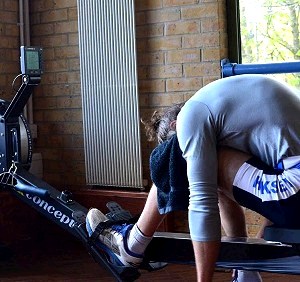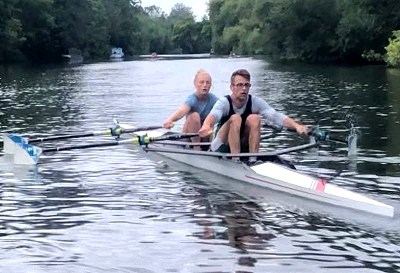 Original MTC: curefa.org/meet-the-community/dr-georg-herdt
Original MTC: curefa.org/meet-the-community/dr-georg-herdtName: Dr. Georg Herdt
Where do you call home? Oxford, UK
Education: PhD in Architecture
What do you want to discuss? The effect of rowing (intense exercise) on FA
Some background: I’ve been living with the knowledge of having FA for almost eight years now. One might think I got used to this life and I should know what I am doing, but it’s rather the opposite. I mourn for my old life, the disease took so much from me: my career, my marriage, it changed my purpose. With the diagnosis came the ‘advice’ that I’d be in need of a wheelchair soon. That’s what the medical textbook on the condition says. It felt like a blanket advice without looking at the individual case. On digging a bit deeper, I got told that ’late onset’ is difficult to assess and the degenerative effect of FA should be linear. I should not expect it to happen quickly — and then I started falling over. This not only meant that some knowledge about FA is probably wrong, this was also the moment when I had to take FA seriously. First offence I took was with the term ‘late onset’. I hate labelling people and being labelled, simply saying “oh, you are just late onset,” as if that changes anything, but what it does is it discredits anything I do to halt the progression. In addition and by far the more important point is — am I really late onset? In order to answer this we have to look at my childhood. As some of you might know, I am an advocate for exercise.
 When did you start rowing? In 1992 I started.
When did you start rowing? In 1992 I started.What made you choose this? I never chose to train as much as I did, it kind of happened. The day I was born my dad signed my membership for Germany's second oldest rowing club, my granddad co-signed it and with it came the unspoken obligation to row — not immediately of course, but I always felt the pressure to do well at this. By around ten or twelve I went all in, I did try other sports in order to avoid family pressure but by then I gave in. Rowing it was.
Does FA impact this? What is the impact on FA? It probably goes the other way round. It does impact FA. I am not saying that rowing is the answer to the effects of FA; I am working on the theory that a) I am not late onset and b) that is because of rowing. In short, rowing stopped the progression of FA back then, it worked for me, which leads to c) will it work again? I have no answer for this yet but I can say that I stopped falling over. This leads to the question of how much exercise is actually needed to stop the progression of FA? The only inkling I’ve got is to use my childhood activity as guidance, ‘simply’ repeating the exercise regimen of my youth.
 At some point, I was the fastest German rower of my age and weight group. This not only wins you a t-shirt, it also puts you on the pathway for the national squad. At this time, I did not only beat my peers, I pushed my genetic disadvantage into insignificance. This physical prowess needs a lot of training to achieve, more than any regular person would ever do. It can briefly be summarised into three different components:
At some point, I was the fastest German rower of my age and weight group. This not only wins you a t-shirt, it also puts you on the pathway for the national squad. At this time, I did not only beat my peers, I pushed my genetic disadvantage into insignificance. This physical prowess needs a lot of training to achieve, more than any regular person would ever do. It can briefly be summarised into three different components:1) Cardio: Basically long sessions at a specific heartrate.
2) Muscle growth: Also quite a regular activity for active people. Basically what you would do in the gym normally.
3) Anaerobic or intervals: This is the odd one, this is the one that hurts bad and no-one would do without a purpose. I suspect that this is the game changer and behind my ‘late onset’.
 Tell us more (about the journey/path with rowing): But let me explain as best as I, as a non sport professional, can do: FA creates a mitochondrial malfunction. Most FA patients had working mitochondria at some stage, usually at young age, before the diagnosis. Then they stop working normally and the first noticeable symptoms appear. This is where intervals, anaerobic training or race preparation comes into the equation. Athletes train their bodies for performance. The big decider is whose body performs best in an self inflicted physically demanding environment. Once you increase intensity over a limited period of time to the point that cellular oxygen supply is compromised, you are in the anaerobic training zone - keep going, this is where you need to be. Now, your cells struggle to generate sufficient energy for your muscles to maintain effort; energy that is generated by the mitochondria. When done regularly, the body adapts in response by producing more mitochondria to optimise energy supply.
This form of training makes athletes physically better, it takes time, repetition and it hurts - a lot. I believe this form of training is the reason behind my ‘late onset’ and it might as well work for me again - halt disease progression by counteracting mitochondrial malfunction.
Tell us more (about the journey/path with rowing): But let me explain as best as I, as a non sport professional, can do: FA creates a mitochondrial malfunction. Most FA patients had working mitochondria at some stage, usually at young age, before the diagnosis. Then they stop working normally and the first noticeable symptoms appear. This is where intervals, anaerobic training or race preparation comes into the equation. Athletes train their bodies for performance. The big decider is whose body performs best in an self inflicted physically demanding environment. Once you increase intensity over a limited period of time to the point that cellular oxygen supply is compromised, you are in the anaerobic training zone - keep going, this is where you need to be. Now, your cells struggle to generate sufficient energy for your muscles to maintain effort; energy that is generated by the mitochondria. When done regularly, the body adapts in response by producing more mitochondria to optimise energy supply.
This form of training makes athletes physically better, it takes time, repetition and it hurts - a lot. I believe this form of training is the reason behind my ‘late onset’ and it might as well work for me again - halt disease progression by counteracting mitochondrial malfunction.Considering my past, I clearly had well trained mitochondria back then and if elite training is what changes that again; then that is what I’ll be doing.
Interviewed by

Please note that this post represents an individual’s experience and is not medical advice. Please consult with your doctor about the safest and best way to manage your FA diagnosis.



